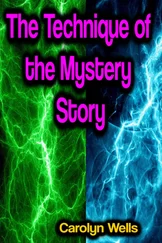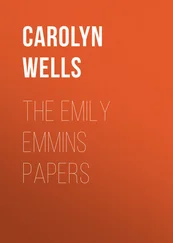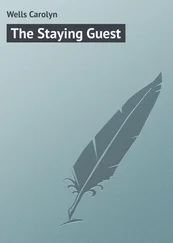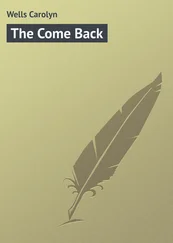Carolyn Wells - The Man Who Fell Through the Earth
Здесь есть возможность читать онлайн «Carolyn Wells - The Man Who Fell Through the Earth» — ознакомительный отрывок электронной книги совершенно бесплатно, а после прочтения отрывка купить полную версию. В некоторых случаях можно слушать аудио, скачать через торрент в формате fb2 и присутствует краткое содержание. Жанр: foreign_prose, на английском языке. Описание произведения, (предисловие) а так же отзывы посетителей доступны на портале библиотеки ЛибКат.
- Название:The Man Who Fell Through the Earth
- Автор:
- Жанр:
- Год:неизвестен
- ISBN:нет данных
- Рейтинг книги:4 / 5. Голосов: 1
-
Избранное:Добавить в избранное
- Отзывы:
-
Ваша оценка:
- 80
- 1
- 2
- 3
- 4
- 5
The Man Who Fell Through the Earth: краткое содержание, описание и аннотация
Предлагаем к чтению аннотацию, описание, краткое содержание или предисловие (зависит от того, что написал сам автор книги «The Man Who Fell Through the Earth»). Если вы не нашли необходимую информацию о книге — напишите в комментариях, мы постараемся отыскать её.
The Man Who Fell Through the Earth — читать онлайн ознакомительный отрывок
Ниже представлен текст книги, разбитый по страницам. Система сохранения места последней прочитанной страницы, позволяет с удобством читать онлайн бесплатно книгу «The Man Who Fell Through the Earth», без необходимости каждый раз заново искать на чём Вы остановились. Поставьте закладку, и сможете в любой момент перейти на страницу, на которой закончили чтение.
Интервал:
Закладка:
Carolyn Wells
The Man Who Fell Through the Earth
CHAPTER I
Moving Shadow-Shapes
One of the occasions when I experienced “that grand and glorious feeling” was when my law business had achieved proportions that justified my removal from my old office to new and more commodious quarters. I selected a somewhat pretentious building on Madison Avenue between Thirtieth and Fortieth Streets, and it was a red-letter day for me when I moved into my pleasant rooms on its top floor.
The Puritan Trust Company occupied all of the ground floor and there were also some of the private offices of that institution on the top floor, as well as a few offices to be let.
My rooms were well located and delightfully light, and I furnished them with care, selecting chairs and desks of a dignified type, and rugs of appropriately quiet coloring. I also selected my stenographer with care, and Norah MacCormack was a red-haired piece of perfection. If she had a weakness, it was for reading detective stories, but I condoned that, for in my hammocky moods I, too, dipped into the tangled-web school of fiction.
And, without undue conceit, I felt that I could give most specimens of the genus Sherlock cards and spades and beat them at their own game of deduction. I practiced it on Norah sometimes. She would bring me a veil or glove of some friend of hers, and I would try to deduce the friend’s traits of character. My successes and failures were about fifty-fifty, but Norah thought I improved with practice, and, anyway, it exercised my intelligence.
I had failed to pass examination for the army, because of a defect, negligible, it seemed to me, in my eyesight. I was deeply disappointed, but as the law of compensation is usually in force, I unexpectedly proved to be of some use to my Government after all.
Across the hall from me was the private office of Amos Gately, the President of the Puritan Trust Company, and a man of city-wide reputation. I didn’t know the great financier personally, but everyone knew of him, and his name was a synonym for all that is sound, honorable, and philanthropic in the money mart. He was of that frequently seen type, with the silver gray hair that so becomingly accompanies deep-set dark eyes.
And yet, I had never seen Mr. Gately himself. My knowledge of him was gained from his frequent portraiture in the papers or in an occasional magazine. And I had gathered, in a vague way, that he was a connoisseur of the fine arts, and that his offices, as well as his home, were palatial in their appointments.
I may as well admit, therefore, that going in and out of my own rooms I often looked toward his door, in hopes that I might get a glimpse, at least, of the treasures within. But so far I had not done so.
To be sure, I had only occupied my own suite about a week and then again Mr. Gately was not always in his private offices during business hours. Doubtless, much of the time he was down in the banking rooms.
There was a yellow-haired stenographer, who wore her hair in ear-muffs, and who was, I should say, addicted to the vanity-case. This young person, Norah had informed me, was Jenny Boyd.
And that sums up the whole of my intimate knowledge of Amos Gately – until the day of the black snow squall!
I daresay my prehistoric ancestors were sun-worshipers. At any rate, I am perfectly happy when the sun shines, and utterly miserable on a gloomy day. Of course, after sunset, I don’t care, but days when artificial light must be used, I get fidgety and am positively unable to concentrate on any important line of thought.
And so, when Norah snapped on her green-shaded desk light in mid-afternoon, I impulsively jumped up to go home. I could stand electrically lighted rooms better in my diggings than in the work-compelling atmosphere of my office.
“Finish that bit of work,” I told my competent assistant, “and then go home yourself. I’m going now.”
“But it’s only three o’clock, Mr. Brice,” and Norah’s gray eyes looked up from the clicking keys.
“I know it, but a snow storm is brewing, – and Lord knows there’s snow enough in town now!”
“There is so! I’m thinking they won’t get the black mountains out of the side streets before Fourth of July, – and the poor White Wings working themselves to death!”
“Statistics haven’t yet proved that cause of death prevalent among snow-shovelers,” I returned, “but I’m pretty sure there’s more chance for it coming to them!”
I hate snow. For the ocular defect that kept me out of the army is corrected by not altogether unbecoming glasses, but when these are moistened or misted by falling snow, I am greatly incommoded. So I determined to reach home, if possible, before the squall which was so indubitably imminent.
I snugged into my overcoat, and jammed my hat well down on my head, for the wind was already blowing a gale.
“Get away soon, Norah,” I said, as I opened the door into the hall, “and if it proves a blizzard you needn’t show up tomorrow.”
“Oh, I’ll be here, Mr. Brice,” she returned, in her cheery way, and resumed her clicking.
The offices of Mr. Gately, opposite mine, had three doors to the hall, meaning, I assumed, three rooms in his suite.
My own door was exactly opposite the middle one of the three. On that was the number two. To its left was number one, and to its right, number three.
Each of these three doors had an upper panel of thick, clouded glass, and, as the hall was not yet lighted and Mr. Gately’s rooms were, I could see quite plainly the shadows of two heads on the middle door, – the door numbered two.
Perhaps I am unduly curious, perhaps it was merely a natural interest, but I stood still a moment, outside my own door, and watched the two shadowed heads.
The rippled clouding of the glass made their outlines somewhat vague, but I could distinguish the fine, thick mane of Amos Gately, as I had so often seen it pictured. The other was merely a human shadow with no striking characteristics.
It was evident their interview was not amicable. I heard a loud, explosive “No!” from one or other of them, and then both figures rose and there was a hand-to-hand struggle. Their voices indicated a desperate quarrel, though no words were distinguishable.
And then, as I looked, the shadows blurred into one another, – swayed, – separated, and then a pistol shot rang out, followed immediately by a woman’s shrill scream.
Impulsively I sprang across the hall, and turned the knob of door number two, – the one opposite my own door, and the one through which I had seen the shadowed actions.
But the door would not open.
I hesitated only an instant and then hurried to the door next on the right, number three.
This, too, was fastened on the inside, so I ran back to the only other door, number one, – to the left of the middle door.
This door opened at my touch, and I found myself in the first of Amos Gately’s magnificent rooms.
Beyond one quick, admiring glance, I paid no attention to the beautiful appointments, and I opened the communicating door into the next or middle room.
This, like the first, contained no human being, but it was filled with the smoke and the odor of a recently fired pistol.
I looked around, aghast. This was the room where the altercation had taken place, where two men had grappled, where a pistol had been fired, and moreover, where a woman had screamed. Where were these people?
In the next room, of course, I reasoned.
With eager curiosity, I went on into the third room. It was empty.
And that was all the rooms of the suite.
Where were the people I had seen and heard? That is, I had seen their shadows on the glass door, and human shadows cannot appear without people to cast them. Where were the men who had fought? Where was the woman who had screamed? And who were they?
Читать дальшеИнтервал:
Закладка:
Похожие книги на «The Man Who Fell Through the Earth»
Представляем Вашему вниманию похожие книги на «The Man Who Fell Through the Earth» списком для выбора. Мы отобрали схожую по названию и смыслу литературу в надежде предоставить читателям больше вариантов отыскать новые, интересные, ещё непрочитанные произведения.
Обсуждение, отзывы о книге «The Man Who Fell Through the Earth» и просто собственные мнения читателей. Оставьте ваши комментарии, напишите, что Вы думаете о произведении, его смысле или главных героях. Укажите что конкретно понравилось, а что нет, и почему Вы так считаете.












